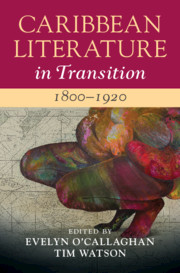Book contents
- Caribbean Literature in Transition, 1800–1920
- Caribbean Literature in Transition
- Caribbean Literature in Transition, 1800–1920
- Copyright page
- Contents
- List of Illustrations
- Contributors
- Acknowledgements
- Introduction
- Part I Literary and Generic Transitions
- Part II Cultural and Political Transitions
- Part III The Caribbean Region in Transition
- Chapter 13 Antillean Sovereignty in Pan-Caribbean Writing
- Chapter 14 Caribbean Literature as Diasporic Archive
- Chapter 15 The Representation of the Caribbean in Nineteenth-Century African American Newspapers
- Chapter 16 The Impact of the American Civil War on Political Writing in Jamaica and Cuba
- Chapter 17 South Asian Migration and Settlement Stories, 1800–1920
- Chapter 18 Francophone–Anglophone Connections in the Nineteenth-Century Caribbean
- Chapter 19 Cuban Literature before 1920
- Chapter 20 José Martí, José Rizal, and Their Speculative Extended Caribbean
- Chapter 21 Translating the Revolution from Haiti to Louisiana
- Part IV Critical Transitions
- Bibliography
- Index
Chapter 17 - South Asian Migration and Settlement Stories, 1800–1920
from Part III - The Caribbean Region in Transition
Published online by Cambridge University Press: 16 December 2020
- Caribbean Literature in Transition, 1800–1920
- Caribbean Literature in Transition
- Caribbean Literature in Transition, 1800–1920
- Copyright page
- Contents
- List of Illustrations
- Contributors
- Acknowledgements
- Introduction
- Part I Literary and Generic Transitions
- Part II Cultural and Political Transitions
- Part III The Caribbean Region in Transition
- Chapter 13 Antillean Sovereignty in Pan-Caribbean Writing
- Chapter 14 Caribbean Literature as Diasporic Archive
- Chapter 15 The Representation of the Caribbean in Nineteenth-Century African American Newspapers
- Chapter 16 The Impact of the American Civil War on Political Writing in Jamaica and Cuba
- Chapter 17 South Asian Migration and Settlement Stories, 1800–1920
- Chapter 18 Francophone–Anglophone Connections in the Nineteenth-Century Caribbean
- Chapter 19 Cuban Literature before 1920
- Chapter 20 José Martí, José Rizal, and Their Speculative Extended Caribbean
- Chapter 21 Translating the Revolution from Haiti to Louisiana
- Part IV Critical Transitions
- Bibliography
- Index
Summary
The standard association of kala pani (black waters) passage with annihilation has supported the long-held view that, throughout the indenture system in the Caribbean, South Asian migrant labourers focused their cultural energies on returning to the ancestral motherland once their contracts ended. This conclusion falls short of explaining instances of reinvention and resistance seen from the earliest years of the system in the mid-eighteenth century, which demonstrate the indenture’s compulsion to grapple with the birth of a new consciousness in which atavistic connotations of identity are deterritorialized and shifted beyond their meaning in Bharat-mata, as the motherland was then known. Early writings by Munshi Rahman Khan (Dutch Suriname), Lal Bihari Sharma (Guyana), and Joseph Ruhomon (Guyana) examine indenture from the perspective of the migrants and challenge traditional representations of this labour group as largely passive, illiterate, and wretched under the colonial pejorative ‘coolie’. Their works underscore the profound importance cultural reinvention played for the migrants in their determination of belonging and becoming in the Caribbean.
- Type
- Chapter
- Information
- Caribbean Literature in Transition, 1800–1920 , pp. 278 - 293Publisher: Cambridge University PressPrint publication year: 2021

